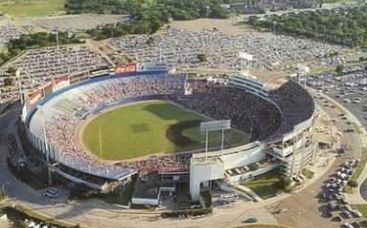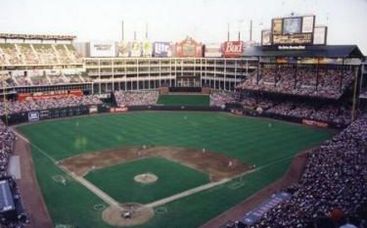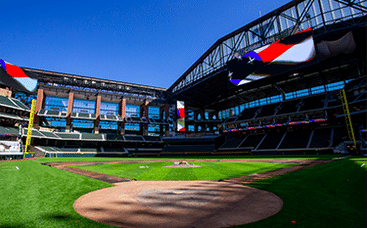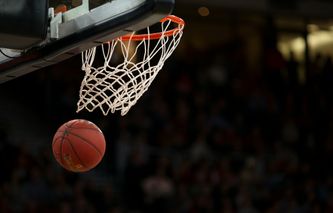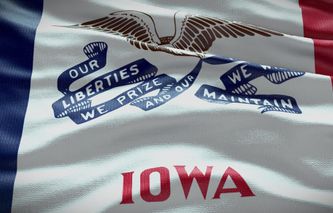
49th Season
First Game Played April 15, 1972
1000 Ballpark Way #400, Arlington, TX 76011
(817) 273-5222
http://www.texasrangers.com
Historical Moments
1972:After getting approval to move to Texas, the Senators change their nickname to the Rangers in honor of the famous Law Enforcement Agency. The Rangers would be playing in a converted minor league stadium in Arlington, Texas, a suburb of the Dallas-Fort Worth Metropolitan Area. Fans waiting to see the Rangers’ first game on April 6th were disappointed as a Player’s Strike delayed the start of the season. The strike would relatively quickly, and the Rangers finally played their first game in Anaheim on April 15th and lost 1-0 pitcher’s duel to the Angles. The Rangers would bounce back to win the next game. Five days later, on April 21st against the same Angels, the Rangers made their Texas debut in front of 20,105 at Arlington Stadium. The Rangers got off to a fast start as Frank Howard homered in the first inning, and would go on to win the game 7-6. The Rangers would not win much that first year, finishing last with a woeful 54-100 record.
1973:During an awful 56-105 season, it is clear the team has to do something to draw fans’ attention. When the Rangers drafted Houston High Schooler David Clyde with the first overall pick, they decide to start him in the majors right away, and he makes his debut on June 27th just 22 days after being drafted. In Clyde’s debut, he strikes out the side in the first inning after walking the first two batters. Clyde would go on to win his debut 4-3. However, the move would not work out in the end as Clyde’s career would only last five years in which he only won 18 games. The other highlights of the season came when Jeff Burroughs hits three grand slams in ten days at the end of July. During the same stretch, Jim Bibby pitches the first no-hitter in franchise history by blanking the eventual World Champion Oakland A’s 6-0.
1974:In the season where baseball finally caught on in the Dallas Metro-area, the Rangers are the surprise of the American League all year, and challenge the Oakland A’s for the American League Western Division title. Leading the charge is fiery manager Billy Martin, who takes a team that lost 105 games the year before and transformed them into an 84-76 contender that finishes just five games behind the three-time World Champion Athletics. One key to the turn around was the acquisition of Ferguson Jenkins from the Chicago Cubs, in his first season in Texas Fergie wins 25 games tying Catfish Hunter for the most in the American League. While Fergie led the charge on the mound Rookie of the Year Mike Hargrove, and MVP Jeff Burroughs spurred on the offense.
1975:The Rangers fall back to earth and finish in third place with a disappointing 79-83 record. Billy Martin, the popular manager of the Rangers, is fired in the middle of the season after a fall out with management. He would land just a few weeks later in the same post with New York Yankees, for what will be the first of five turbulent tenures as manager of the Bronx Bombers.
1976:The Rangers continue to struggle as they finish in fourth place with a record of 76-86.
1977:After a slow 31-31-start, the Rangers fire manager Frank Lucchesi. Over the next week, the Rangers try out two different coaches before hiring long-time Baltimore Orioles coach Billy Hunter. The moves works out as Ryan leads the Rangers to 60-33 record over the remainder of the season. The surge would land the Rangers in second place with a 94-68 record, but they could only get within eight games of the first-place Kansas City Royals. The highlight of the surge came on August 27th in New York, when Toby Harrah and Bump Willis hit back-to-back inside the park homers.
1978:The Rangers are part of a three-way race for the AL West title with the Kansas City Royals and California Angels before finishing tied for second place with an 87-75 record. Leading the way is Bobby Bonds and Richie Zisk, who each hit more than 20 Homers. On the mound, Ferguson Jenkins, who was reacquired in the off-season, leads the way with 18 wins and a 2.27 ERA.
1980:On May 3rd Ferguson Jenkins becomes the fourth player to win 100 games in each league by beating the Baltimore Orioles 3-2 at Arlington Stadium. Jenkins would have a disappointing 12-12 record with a 3.77 ERA, while the Rangers settled for fourth place with a 76-85 record.
1981:Newly acquired Left Handed pitcher Rick Honeycutt gets off to a fast start by collecting four straight shutouts in April. The Rangers find themselves embroiled in a tight race with the Oakland Athletics, as a player’s strike loomed in early June. With a strike looming, the Rangers were in first place by half of game, but after the Rangers blew 3-1 lead on the day before the strike started, and were forced to look up at the A’s. Had the Rangers held on to win that game, they would have been in first when the strike started, thus earning them a trip to the postseason, as first-half champions since baseball decided to split the season. Once games resumed in August, the Rangers struggled and were never a factor in the second half posting an overall record of 57-48.
1982:The Rangers struggle all season as they finish in sixth place with a woeful 64-98 record. Despite the struggle for one magical week outfielder Larry Parish was the best player in baseball. Between July 4th& 10th, Parrish ties a major league record with three grand slams in one week and collects 19 RBI while batting .514.
1983:On July 3rd, the Rangers set a major league record by scoring 12 runs in an extra-inning. In that magical 15th inning the Rangers send 16 batters to the plate at Oakland to post a 16-4 victory over the Athletics. The Rangers would go on to finish the season with a 77-85 record good enough for third place in the West.
1984:A disappointing last place 69-92 season is punctuated by a Perfect Game thrown by California Angels Mike Witt on the final day of the season at Arlington Stadium.
1985:The Rangers finish in last place for the second year in a row as they narrowly avoid a 100-loss season with a record of 62-99.
1986:After losing 99 games in 1985, the Rangers jump up to challenge the California Angels for the Western Division Title before falling five games short with an 87-75 record. Leading the charge are Rookies Pete Incavigilia who hits 30 home runs, and Ruben Sierra, who hits 16 home runs. The rookies were not the only ones going deep for the Rangers veterans Larry Parrish, and Pete O’Brien each hit more than 20 home runs and drove in more than 90 runs.
1987:The Rangers and California Angels battle for positioning again. However, this time it is to avoid last place, as the Rangers post a disappointing 75-87 record while finishing tied for the worst record in the American League West.
1988:The Rangers continue to struggle as they finish in sixth place with a woeful record of 71-91. After two mediocre seasons and a history without a championship of any form, the Rangers are regarded as the least valuable franchise in baseball. Complicating matters is Arlington Stadium; a converted minor-league stadium without luxury boxes did not help the team make any money. Arlington Stadium was thought of so poorly, that it was never considered to host an All-Star Game. This all contributed to instability at the top, as the Rangers were sold to the fourth owners in just 17 years. However, this ownership group would be different, as among their plans was to get the team a new stadium and transform the club into contenders. George Walker Bush and Edward Rose head the group up. Bush becomes the figurehead as his father was in his first few months as President of the United States, after eight years serving as Vice President. With this political influence, a new ballpark would only be a matter of time and planning, but contending would be much harder.
1989:Before the season in an attempt to draw more fans, the Rangers sign 42-year-old free agent pitcher Nolan Ryan. The move works as Nolan has a great season winning 16 games while leading the American League with 301 strikeouts. While collecting 300 strikeouts for the sixth time in his career Nolan already the all-time career leader, collects career strikeout number 5,000 on August 22nd against Rickey Henderson of the Oakland A’s. The Rangers would go on to finish in fourth place with an 83-70 record, as Ruben Sierra led the American League In RBI with 119.
1990:The Ryan Express continues to roll down the track at age of 43. In his second season with the Rangers, Nolan Ryan wins 13 games and leads the league in strikeouts for the 11th time in his great career. However, it is the other milestones that Nolan collects that get all the headlines. First, on June 11th in Oakland, Nolan Ryan becomes the oldest pitcher ever to throw a no-hitter against the A’s. It was the record sixth of his career, almost ten years after his fifth one. Then on July 31st at Arlington Stadium, Nolan Ryan earns his 300th career win with 11-3 victory against the Milwaukee Brewers. The milestones have little effect on the Rangers playoff drive as the team finishes in third place with an 83-79 record.
1991:On May 1st, the big news is Rickey Henderson, who steals the 939th base of his career, establishing a new record. However, by the time midnight struck, he would have to share the spotlight. Just hours after Rickey’s record-breaker, Nolan Ryan throws his seventh and final career no-hitter in a 3-0 win over the Toronto Blue Jays at Arlington Stadium. His seven career no-hitters are three more than his nearest competitor, and at 44 years, three months and one day, Ryan is the oldest pitcher ever to throw a no-hitter. Nolan would go on to win 12 games that year, helping the Rangers to their third straight year with wins in the mid-’80s.
1992:As construction begins on a new ballpark, the Rangers suffer through a disappointing fifth-place 77-85 season. Even Nolan Ryan shows his age finishing with a 5-9 record with a 3.72 ERA. In a move to shake things up, the Rangers trade Ruben Sierra to the Oakland Athletics for Jose Canseco at the trading deadline.
1993:All good things must come to an end, as after 27 years 1993 would be the last stop on the Nolan Ryan Express. However, the season in which was supposed to be a victory tour is cut short by injuries, as Ryan is limited to just 13 starts, as the arm which dominated baseball for nearly three decades ran out of gas. Even though he did not go out in a blaze of glory, there is no doubt that the next stop for the Ryan Express is the Hall of Fame and Cooperstown. The season also marks the end of Arlington Stadium as the Rangers look to be a strong contender for the American League West Title. However, the Rangers title chances take a hit when Jose Canseco injures himself pitching in a blowout loss at Boston. The injury shelves Canseco for more than half of the season as the Rangers fall eight games short of the West title with an 86-76 record.
1994:The Rangers finally get a ballpark; built for themselves as the state of the art Ballpark in Arlington opens its doors. The Rangers begin their new era on a disappointing note as the Rangers lose the home opener on April 11th against the Milwaukee Brewers. The new Ballpark highlight comes on July 28th as Kenny Rogers throws a Perfect Game against the California Angels. However, the season is filled with disappointments as the Rangers struggle all year and fall ten games below .500. In the restructured AL West, it is good enough for first place, and as August begins, the Rangers are the best of a bad lot leading a division in which all four teams are more than ten games below .500, with a record of 52-62. However, the season would end prematurely as a player’s strike that began on August 12th would go on to cancel the rest of the regular season and playoffs. Since the Rangers are first, they collect their first division title but are still without a postseason appearance. The Rangers change ownership again as the Bush group sells the team after the opening of the new stadium. However, the group did what it set out to do it gets a new stadium, turns the team into a contender, and even lands the franchise its first All-Star Game, which would be in 1995. The group turns one of the sport’s least valuable franchises into a stable, viable team for years to come. While the sale was being finalized owner, George W. Bush was making a successful run for Governor of Texas.
1995:Coming back from the strike, The Ballpark in Arlington host the All-Star Game, but few fans pay much attention as the strike has many fans still angry. The Ballpark is sold out, but the game collects the lowest Television Ratings in its history. For the season, the Rangers finish with a 74-70 record good enough for third place, four games out of first in the Western Division.
1996:With American League MVP Juan Gonzalez establishing new club records in home runs with 47 and RBI with 144, the Rangers grabbed the lead in the Western Division early. With the Seattle Mariners being the only other team in contention, the Rangers went into late September, holding a small but comfortable lead in the West. On September 27th, in front of a full house in Arlington, the Rangers finally dispatched 25 years of frustration by winning the division title and earning a trip to the postseason while posting a solid 90-72 record. In the Rangers’ first postseason series, they faced the New York Yankees, a team that has more postseason experience than any other franchise in the Division Series. The Rangers got off to a fast start by winning Game 1 in historic Yankee Stadium 6-2. Leading the way was the 1-2 punch of Juan Gonzalez and Ivan Rodriguez. The Rangers would also get off to a fast start in Game 2 as Juan Gonzalez continued to slam Yankees pitching. However, the Yankees would rally, and when 3B Dean Palmer threw away a bunt on the 12th, the series was tied to one apiece. As the series came to Arlington, a sellout crowd greeted the Rangers who were hosting their first Playoff game. The Rangers would hold a 2-1 lead into the ninth inning, but the bullpen could not close the deal as the Yanks rallied again to take a 2-1 series lead. In Game 4, with their backs to the wall, the Rangers jumped out to a 4-0 lead as Juan Gonzalez went deep for the fifth time in the series. However, the bullpen could not hold the lead, and the Yankees would chip away, before taking the lead for good in the seventh inning, to close the series three games to one.
1997:On June 12th, The Ballpark at Arlington hosts the 1st Interleague Game in regular-season history. Rangers pitcher Darren Oliver throws the first pitch as the San Francisco Giants win the game 4-3. The Rangers also made another Interleague first as Bobby Witt goes deep on June 30th at Dodger Stadium to become the first American League pitcher to hit a home run in a regular-season game in 25 years. However, despite the Interleague highs, the team suffers disappointing lows, as they fall to third place with a disappointing 77-85 record.
1998:After a disappointing season, the Rangers bounce back to reclaim the division title with an 88-74 record. Also returning to top form was Juan Gonzalez, who won his second MVP award in three years by hitting 45 home runs and driving in 157 runs. In the Division Series, the Rangers were matched up against the New York Yankees again. However, the series would be over quickly as the Rangers offense sputtered and only scored one run during the three-game sweep. In the final game played at The Ballpark in Arlington, the Rangers had added misery of sitting around more than three hours because of a rain delay. When the game finally resumed, a sparse crowd watched the Rangers fall 4-0.
1999:The 1-2 punch of Juan Gonzalez and Ivan Rodriguez is given even more punch as Rafael Palmeiro is reacquired as a Free Agent. Palmeiro hits 47 home runs and 147 RBI while Juan Gonzalez and American League MVP Ivan Rodriguez both drive in more than 100 runs and smack over 30 home runs. The trio is joined by outfielder Rusty Greer who also reaches the century mark in RBI as the Rangers scored 945 runs and hit .293 as a team. The Rangers would go on to win a club-record 95 games to win their third division title in four years. However, in the ALDS, the Rangers appeared intimidated as they faced the New York Yankees once again. The Yanks would sweep the Rangers again, winning the three games by a combined score of 14-1. After the season, the Rangers would stun baseball by trading Gonzalez to the Detroit Tigers in a multi-player deal.
2000:The Rangers offense continues to be strong as Ivan Rodriguez and Rafael Palmeiro both get off to strong starts. However, Rangers’ pitching is among baseball’s worst as the club falls into last place. Then the season goes from bad to worse as an injury sidelines Rodriguez for the rest of the season, but Pudge still manages to hit 29 home runs despite only playing in 91 games. The Rangers would go on to finish with a disappointing 71-91 record. After the season, the Rangers shock baseball by signing Alex Rodriguez away from the Seattle Mariners with a record ten year $ 250 million deal. In an interesting side note, former Texas Rangers owner who was also served as Governor of Texas George W. Bush received the Republican nomination for President and was entrenched in the tightest race in Presidential History, winning by the slimmest margin possible. The race was so close that it was disputed in courts over a month. Bush would become the second son of a president to serve as President, as well as the first sport’s owner to become President. President Bush, not forgetting his roots, even installed a small baseball field on the White House lawn for Washington area Little Leaguers to use.
2001:With the signing of Alex Rodriguez, the Rangers have one of the strongest lineups in baseball history, with A-Rod leading the way by hitting 52 home runs, and winning the Hank Aaron award. However, they also have one of the worst pitching staffs in baseball history as the team compiled an awful 5.71 ERA on the way to a last-place 73-89 season. Early in the season manager, Johnny Oates would suddenly resign sighting fatigue. Sadly the fatigue would later be linked to a brain tumor that would claim his life.
2002:Juan Gonzalez is welcomed back to Texas as he signs a Free Agent Deal before the start of the season. Gonzalez is limited to just 70 games, and 35 RBI. Meanwhile, his former MVP counterpart Ivan Rodriguez also struggles with injuries missing more than 50 games. However, the offense was not a problem for the Rangers as Alex Rodriguez continued to be the premier player in the American League with a Major League-best 57 home runs and 142 RBI. He captured the Hank Aaron Award for the second straight season. Any chance of winning the MVP was taken away by the Rangers pitching staff, which was awful again posting an ERA 5.16 while dealing with a bullpen that blew 32 late-inning leads, as the Rangers finished in last place for the third year in a row with a 72-90 record. Following the season, the Rangers would let go Ivan Rodriguez in a cost-cutting move while hiring Buck Showalter as the team’s new manager. In Showalter, they have a proven winner who had played vital roles in the building of the New York Yankees recent dynasty and Arizona Diamondbacks’ quick rise for expansion to Champions.
2003:Under new Manager Buck Showalter the Texas Rangers continued to struggle with terrible pitching as they posted a Major League worst team ERA of 5.67, on the way to finishing in last place for a 4th straight season with a 71-91 record. The terrible pitching would once again overshadow the significant individual accomplishments of Alex Rodriguez, who hit a Major League-best 47 homers while becoming just the second player to win the MVP award despite playing on a last-place team. Rafael Palmeiro achieved his career milestone 500th homer in another solid 38 homers 112 RBI season. In the All-Star Game, Hank Blalock would secure home field for the American League in the World Series with a game-winning two-run homer in the eighth inning off Los Angeles Dodgers closer Eric Gagne, who did not blow any saves during the regular season. With a payroll over $100 million following the season, the team decided to hold a fire sale allowing Palmeiro and Juan Gonzalez to leave through free agency while seeking to trade A-Rod. The Rangers first flirted a deal with the Boston Red Sox, however, the player’s association would not allow it. The Rangers would eventually find a deal with the New York Yankees trading their MVP for Alfonso Soriano in a trade at the end of the off-season.
2004:After the trade of Alex Rodriguez to the New York Yankees, most expected the Rangers to be dreadful. Instead, they experienced a complete turn around as the Rangers’ new young core of talent more than made up for the loss of the reigning American League MVP. Michael Young, Mark Teixeira, and Hank Blalock had breakout seasons as the Rangers were in the thick of a three-team race for the American League Western Division Title all year with the Anaheim Angels and Oakland Athletics. Also, helping the Rangers was an improved pitching staff led by the return of Kenny Rogers, who led the team with 18 wins, while closer Francisco Cordero recorded 49 saves. Down the stretch injuries would become a factor for the Rangers as Alfonso Soriano was lost at the beginning of September to a hamstring injury. The Rangers ended up finishing in third place with an 89-73 record just three games behind the first-place Angels as Buck Showalter was named Manager of the Year.
2005:Hoping to build off their strong season, the Rangers would get off to a shaky start as they had a mediocre 12-13 record in April. Come May the Rangers would turn things around as led by a resurgent Kenny Rogers who went 6-0 the Rangers posted an 18-7 record including nine straight wins to close the month in first place. The Rangers fortunes would turn again in June as they lost eight of their first ten games on the way to miserable 10-17 month. The Rangers lost five critical games to the Los Angeles Angels along the way. At the same time, Kenny Rogers found himself in hot water after attacking two cameramen before a June 30th game at the newly renamed Ameriquest Field. Rogers would end up getting charged with assault and suspended 20-games, which would later be reduced on appeal. Without Rogers, the Rangers pitching would struggle as they slid into third place and fell below .500. Rogers would return in August and struggle losing three games as the Rangers faded out of the playoff race on the way to finishing in 3rd place with a disappointing 79-83 record. Providing something for Rangers fans to cheer down the stretch would be Mark Texiera, who slammed 43 homers with 144 RBI.
2006:Playing a tough early schedule, the Rangers would get off to a slow start losing seven of their first nine games. As April came to a close, the Rangers reversed course and were playing well and above .500 at 13-12. Over the next three months, the Rangers would hover near .500, but in the mediocre AL West, it had them at or near the top of the division for much of the season’s first half. Coming out of the All-Star Break, the Rangers would stumble as a 6-game losing streak had them reeling at the trade deadline. Hoping to revive their flagging playoff hopes, the Rangers acquired Carlos Lee and Nelson Cruz from the Milwaukee Brewers in exchange for Kevin Mench, Francisco Cordero, Laynce Nix, and a prospect pitcher at the deadline. While Carlos Lee played strong in the final two months with nine Home Runs and 35 RBI with a .322 average, the Rangers would fade in August despite posting a winning record at 17-12, as the Oakland Athletics won 22 of 27 games during the same period. Out of the race in September, the Rangers would play mediocre baseball down the stretch as they finished in third place with a record of 80-82. The let down would lead to wholesale changes as Manager Buck Showalter was fired and replaced by Ron Washington. Carlos Lee, Gary Matthews Jr., Mark DeRosa, and Adam Eaton all departed through free agency.
2007:Under a new manager, Ron Washington, the Rangers entered the season hopeful they could contend in the American League West. However, they would get off to a rocky start as Michael Young, and Mark Teixeira struggled in the early going as they posted a 10-15 record in April. In May, things would get worse as Hank Blalock suffers a case of thoracic outlet syndrome, a nerve disorder that affects the neck and shoulder, as the Rangers found themselves in last place with a record of 19-35 at the end of May. Things would get better in June as the Rangers posted a winning record, thanks to a strong bullpen led by Eric Gagne, who was making a case for comeback player of the year after missing the better part of two seasons with the Los Angeles Dodgers. Also making a comeback was Sammy Sosa, who was out of baseball entirely in 2006, but returned with the Rangers in 2007, 18 years after he was traded for Harold Baines, as he hit his 600th career home run on June 20th against the Chicago Cubs. As July came to an end, the Rangers with a 46-59 record decided to cut bait and deal for prospects as Gagne is sent to the Boston Red Sox for Kason Gabbard, David Murphy, and Engel Beltre. Mark Teixeira is sent to the Atlanta Braves with Ron Mahay for Jarrod Saltalamacchia, Elvis Andrus, and Matt Harrison. Despite the sell-off, the Rangers had their big moments in the final two months as they set a record for the biggest blowout in MLB history as they drubbed the Baltimore Orioles 30-3 on August 22nd, as they played .500 ball in the All-Star Game while finishing in last with a record of 75-87.
2008:The Texas Rangers stumbled out of the gate posting a terrible 10-18 record after the first month of play. Arlington’s focus was on the remarkable Josh Hamilton, who won the American League Player of the Month with a league-high 32 RBI, with a solid .330 average. Hamilton was the first overall pick in the 1999 draft by the Tampa Bay Devil Rays and seemed right on target for superstardom. A 2001 car accident seemed to throw his life off track, as Hamilton began using hard drugs, including crack cocaine and heroin. Over the next two years in the minors, Hamilton played sparingly due to injuries. The drug use would eventually even cost him a spot in the minors, as he was suspended for the entire 2004 and 2005 seasons. Ultimately, Hamilton would become a Born Again Christian, and became clean in 2005. Baseball would give him another chance but required he be under constant monitoring. After spending 2006 in the minors for the Rays, he got an opportunity to play in the majors with the Cincinnati Reds in 2007, putting up solid numbers. The Rangers would land Hamilton in a trade Edinson Volquez and Danny Herrera. Hamilton continued to be the story of the Rangers season in May, as he repeated as Player of the Month, becoming the feel-good story of the first half. Josh Hamilton said he had a dream of being cheered at Yankee Stadium and hitting home runs in an interview. That dream would come true as he stole the show of the Home Run Derby during the All-Star Game festivities hitting a record 28 homers in the first round. Hamilton would end up finishing second to Justin Morneau, as he seemed to run out of gas in the final round. He would go on to lead the Majors in RBI with 32 home runs, and a .304 average. The Rangers would recover from their slow start, but would not factor in any division race, as the Los Angeles Angels won the division by 21 games, with the Rangers finishing in second place with a 79-83 record.
2009:Ranked by Baseball America as the best farm system in baseball, the Rangers begin to bear fruit of the homegrown talent as they play solid baseball early in the season. One rookie who had an immediate impact was SS Elvin Andrus, who finished second in Rookie of the Year voting by batting .267 with six Home Runs and 40 RBI while stealing 33 bases. With the strength of a 20-9 May, the Rangers took control of the American League Western Division. Highlighting the Rangers early surge was a career day from Ian Kinsler, who went 6-for-6 and hit for the cycle in a 19-6 win over the Baltimore Orioles. The Rangers suffered a blow when Josh Hamilton suffered an abdominal tear, which limited 89 games, ten homers, and 54 RBI. With Hamilton missing much of June, the Rangers posted an 11-15 record and were passed by the Los Angeles Angels. The Rangers recovered to post a 17-8 record to keep pace with the Angels in July. However, the Rangers only managed .500 ball over the final two months, as the Rangers budget restrictions would not allow them to make any improvements at the trade deadline, as Owner Tom Hicks needed a loan from MLB to meet the team’s payroll. The Rangers would go on to finish the season in second place with a record of 87-75. Following the season, it was learned Manager Ron Washington tested positive for cocaine use. Despite admitting to using the drug, Washington was allowed to keep his job, as he was coming off the Rangers’ best season in five years. The Rangers were also put for sale during the off-season as the financial troubles of Owner Tom Hicks forced him to declare bankruptcy.
2010:With the team in Chapter 11, MLB took over the day to day operation of the Rangers, as new owners were sought. With their hands tied financially, the Rangers needed to be creative when attempting to add players to the team. This led them to pick up veterans who were seen to be past their prime and available at a discount; three of these players, Rich Harden, Colby Lewis, and Vladimir Guerrero, would play a key role early in the season. The Rangers would start slowly posting an 11-12 record. Fortunately for them, the entire American League West played mediocre baseball in April, as they ended the month just a half-game out of first. In May, it would be more of the same as the Rangers led the division most of the month, despite their record continuing to hover near .500. As June began, the Rangers were ready to breakout, posting the best month in franchise history at 21-6, highlighted by an 11 game winning streak which would see them take over first place for the remainder of the season. Meanwhile, off the field, the Rangers’ financial situation was resolved as a new ownership group led by Chuck Greenberg, and Nolan Ryan took over the team after a lengthy bidding process. This enabled the Rangers to add some pitching depth, as they sent Justin Smoak, with two other minor leaguers to the Seattle Mariners for former Cy Young Award winner Cliff Lee and Mark Lowe on July 9th. The Rangers struggled a bit heading into the All-Star Break, losing four straight games at home to the lowly Baltimore Orioles. They got back on track right away after the break, winning three of four games against the Boston Red Sox in Fenway Park, highlighted by a cycle from newly acquired Catcher Bengie Molina. Despite struggling at times in August, the Rangers’ lead continued to grow in the West. There would not be much drama in September, as the Rangers would easily win the division title their first since 1999. However, one essential series came at home against the New York Yankees, in which the Rangers easily won three straight at home. The Rangers would close the season with a record of 90-72, as Josh Hamilton was named American League MVP with a league-high .359 average, with 32 home runs and 100 RBI. Meanwhile, Neftali Feliz was named Rookie of the Year, by becoming the first rookie to save 40 games in a season.
2010 Playoffs:In the playoffs, the Rangers were an underdog as they faced the Tampa Bay Rays; late in the season, Josh Hamilton was hampered by a rib injury and was a question mark as the ALDS began. With Cliff Lee on the hill in Game 1, the Rangers ended a nine-game postseason losing streak, with a 5-1 win at Tropicana Field, as Nelson Cruz and Bengie Molina provided the offense with home runs. With C.J. Wilson and two relievers combining for a two-hit shutout, the Rangers would win 6-0 in Game 2, to come within one game of their first trip to the ALCS in franchise history. However, as the series shifted to Arlington, the Rays would claw their way back in the series with a 6-3 win in Game 3. The Rays would win 5-2 in Game 4 to send the best of five series back to Tampa, with a chance to win the series at home. However, the Rangers turned to Cliff Lee again, and he delivered pitching a complete game as the Rangers won 5-1 to win their first-ever postseason series. Advancing to the ALCS, the Rangers would be matched up against the defending World Champion New York Yankees. In three previous playoff series against the Yankees, the Rangers won the first game of the 1996 ALDS but lost the next nine games, including sweeps in 1998 and 1999. Early on in Game 1 thing looked good for the Rangers as Josh Hamilton smacked a three-run home run off CC Sabathia in the first inning as the Rangers took an early 5-0 lead. However, the Rangers bullpen faltered, allowing five runs in the eighth inning as the Yankees rallied to win 6-5. Some baseball experts suggested at that point the series was already over for the Rangers. With Colby Lewis delivering a solid start, the Rangers won the biggest game in franchise history, beating the Yankees 7-2 in Game 2 of the ALCS. It was the Rangers’ first-ever postseason win in Arlington. With the series tied 1-1, the Rangers sent Cliff Lee to the mound for Game 3 at Yankee Stadium and got a dominating performance, with just two hits allowed over eight innings, as Lee struck out 13 Yankees, as the Rangers won 8-0. Leading the offense was again was Josh Hamilton, who got the Rangers on the board early with a two-run home run in the first inning of Andy Pettitte. The Rangers would continue to pound Yankees pitching in Game 4, winning 10-3 as Josh Hamilton homered twice. However, the big blow came from Bengie Molina as his three-run blast in the sixth inning gave the Rangers the lead. After the Yankees won 7-2 in Game 5, the series shifted back to Texas, where Colby Lewis held the Yankees in check, allowing one run on three hits in eight innings as the Rangers won 6-1 to reach the World Series. Josh Hamilton, who hit four series home runs, would be named ALCS MVP.
2010 World Series:Cliff Lee would take the mound as the Rangers faced the San Francisco Giants in Game 1 of the World Series. However, the much-anticipated duel between Lee and Giants ace Tim Lincecum never developed as both pitchers struggled, with the Giants taking the opener 11-7. The Rangers would continue to struggle by the bay in Game 2, as the Giants won 9-0 to take a 2-0 lead with them to Texas. Needing a win as the series shifted to Arlington, the Rangers got another strong start from Colby Lewis as Mitch Moreland, and Josh Hamilton provided the offense with home runs in a 4-2 win. However, the Giants with Rookie pitcher Madison Bumgarner on the hill would take a 3-1 series lead by shutting down the Rangers 4-0 in Game 4. Game 5 would see a rematch of Tim Lincecum and Cliff Lee, this time. It would be the pitcher’s duel fans anticipated in the opener. Once again, the Giants would prevail as Edgar Renteria broke a scoreless game with a three-run home in the seventh inning. Nelson Cruz would respond with a homer of his own in the bottom of the inning, but it was not enough as the Giants clinched the series with a 3-1 win. Following the season, the Rangers would lose Cliff Lee, as he chose to return to the Philadelphia Phillies as a free agent.
2011:The Rangers would make a few additions to their American League Championship team, picking up All-Star 3B Adrian Beltre to add more punch to their lineup. They also acquired Catcher Mike Napoli they hoped their young pitchers could ease the loss of Cliff Lee. The Rangers got off to a terrific start, sweeping the Boston Red Sox, who were considered heavy favorites to reach the World Series, as part of a perfect 6-0 season-opening homestand. Ian Kinsler became the first player in MLB history to lead off the first two games of the season with home runs. The Rangers continued their excellent play into the second week, as they won nine of their first ten games before Josh Hamilton suffered an injured shoulder in a home-plate collision against the Detroit Tigers. The Rangers would also deal with injuries to the bullpen as Neftali Feliz spent time on the disabled list, while Darren O’Day was lost for the season. Nelson Cruz meanwhile would miss a few weeks in May. Despite the injury problems, the Rangers stay at or near first place as they entered July with a record of 43-39. Helping the Rangers stay afloat was the breakout performance of Alexi Ogando, who won his first seven decisions after being named to the starting rotation, while both Adrian Beltre and Mike Napoli made immediate contributions. As the All-Star Game approached, the Rangers began to get healthy as they won seven straight headings into the break. However, tragedy would strike Arlington when a fan named Shannon Stone. The Rangers started a Shannon Stone memorial fund for the family and planned to place a monument at the home plate entrance of a father and son walking into the Ballpark. The Rangers started a Shannon Stone memorial fund for the family and planned to place a monument at the home plate entrance of a father and son walking into the Ballpark. The Rangers streak would eventually reach 12 games before they suffered a 9-8 loss to the Los Angeles Angels. Even as they posted a solid 18-9 record in July, the Rangers looked to make improvements to their bullpen as they picked up Koji Uehara from the Baltimore Orioles in exchange for Chris Davis, while they acquired Mike Adams from the San Diego Padres for prospects. They would later add Michael Gonzalez also from the Orioles. Entering September, the Rangers continued to hold the lead over the Angels, as they again gave the Red Sox a hard time, winning two of three during a Labor Day weekend series in Fenway Park. It would be the springboard the Rangers needed to finish the season strong, as they posted a 19-6 record in September to win the AL West for the second straight season with a record of 96-66.
2011 ALDS and ALCS:Facing the Tampa Bay Rays in the ALDS for the second straight season, the Rangers started poorly, losing the opener at home 9-0, as they were handcuffed by 22-year-old rookie Matt Moore, who held them to just two hits. After falling behind early in Game 2, the Rangers bats came alive Mike Napoli, David Murphy and Mitch Moreland led the way in a five-run fourth inning. The Rangers would go on to win the game 8-6 to even the series. Colby Lewis and David Price would face off in a pitcher’s duel in Game 3 as the series shifted to Tampa. The Rays would hold a 1-0 lead entering the 7th inning when the Rangers bats again exploded for four runs, powered behind a go-ahead two-run homer from Mike Napoli. The Rangers would go on to hold off a Rays rally to win 4-3. The Rangers would go on to win the series in four games, as they won 4-3 in Game 4, with Adrian Beltre hitting three home runs to lead the way. After a summer-long drought in Texas, the rain came to the Metroplex just in time for Game 1 of the ALCS against the Detroit Tigers, interrupting the game twice. However, the Rangers would not complain, as they won the game 3-2, with Nelson Cruz’s two-run homer being the difference. Rain would delay Game 2 for a day, but it would be worth the wait, as the game went into extra inning tied 3-3 after a seventh-inning home run from Cruz tied the game. Nelson Cruz would not be finished as he ended the game with a grand slam home run in the 11th inning to give the Rangers a 7-3 win. It was the first walk-off grand slam in postseason history. After the Tigers won 5-2 in Game 3, Nelson Cruz continued his torture of Tigers pitching hitting a three-run blast in the 11th inning, as the Rangers again won in 11 innings 7-3 to take a commanding 3-1 series lead. The Tigers would stay alive with a 7-5 win in Game 5, as Nelson Cruz hit his fifth home run of the series in the loss. The Tigers would take an early 2-0 lead as the series returned to Texas for Game 6. However, the Rangers bats would explode with nine runs in the third inning to all but put the series on ice. The Rangers would go on to win the game 15-5, with Nelson Cruz delivering one more parting shot, as he hit a postseason series record sixth ALCS home run. Cruz also had a record 13 RBI as he was named ALCS MVP.
2011 World Series:After losing the 2010 World Series, the Rangers hoped to claim their first-ever crown as they faced the St. Louis Cardinals in the Fall Classic. After a 3-2 loss in the opener, the Rangers faced the possibility of losing the first two games on the road, as they trailed 1-0 in the ninth inning of Game 2, as Colby Lewis and Jaime Garcia faced off in a pitcher’s duel. However, the Rangers would rally scoring runs on sacrifice flies by Josh Hamilton and Michael Young to even the series with a 2-1 win. The Rangers would rather forget Game 3 as the series shifted to Arlington; instead, they would like to forget what Albert Pujols did to them, as the Cardinals slugger hit three home runs to pace the Cardinals to a 16-7 win. Needing a big start in Game 4, the Rangers got just what the doctor ordered from Derek Holland, as the young lefty with the crazy mustache allowed only two hits and pitched into the ninth inning as the Rangers evened the series with a 4-0 win. After falling behind early 2-0 in Game 5, the Rangers turned to their bullpen to keep the game close, as homers by Mitch Moreland and Adrian Beltre tied the game 2-2. The Rangers would go on to win the game 4-2 on a two-run double by Mike Napoli to put the Rangers one game away from a World Championship. The Cardinals would not be easy, as the Rangers took the lead three times in Game 6, which was delayed by rains in St. Louis one day. However, with three runs in the seventh inning, the Rangers appeared to have delivered the knockout punch behind back to back home runs from Adrian Beltre and Nelson Cruz. The Cardinals thought would not go away, scoring a run in the 8th inning on a home run by Allen Craig to make the score 7-5. However, with Neftali Felix on the mound in the ninth inning, all of Texas waited to cap a championship summer that began with the NBA Champion Dallas Mavericks and appeared to be ready to end with the Texas Rangers resulting up a World Series. The Cardinals were down to their last strike when David Freese tripled over the head of Nelson Cruz to knock home two runs and tie the game 7-7. Stunned by not shaken, the Rangers quickly rebounded as Josh Hamilton hit a two-run home in the tenth inning to give Texas a 9-7 lead. For Hamilton, who was playing with a sports hernia, it was his first home run of the postseason. Fans again in Texas stood on their seats ready to celebrate, but once again, their hearts were ripped out of their chest as the Cardinals down to their last strike again rallied to tie the game. The Cardinals would go on to win the game in 11 innings on a walk-off home run by Freese, who was mobbed at home plate, as St. Louis was the ones who were celebrating like it was New Year’s Day ending what may have been the greatest World Series game ever played. With Josh Hamilton and Michael Young, each driving home runs with a double the Rangers scored twice in the first inning of Game 7. However, as if to remind them of the cruel ending of Game 6, the Cardinals quickly tied on a double by Game 6 hero David Freese. The Cardinals would take the lead in the third inning on a solo shot from Allen Craig. It was just a slow case of what might have been as the Rangers gave the Cardinals two runs with a bases-loaded walk and hit batter in the fifth inning. In the sixth inning, Nelson Cruz lifted a shot to leftfield that could have been the jolt the Rangers needed to revive their hopes. However, Allen Craig climbed the fence and stole a home run away, keeping the score 5-2 in favor of the Cardinals. The Cardinals would go on to win the game and the series 6-2, as the Rangers were left to ponder what might have been.
2012:After a second straight heartbreaking loss in the World Series, the Rangers looked to improve their pitching staff, as they signed Closer Joe Nathan and moved Neftalí Feliz into the starting rotation, which was also bolstered by the signing of Yu Darvish from Japan. To get Darvish, the Rangers needed to purchase his negotiating rights form the Hokkaido Nippon-Ham Fighters for $51.7 million. They then signed Darvish to a six-year deal worth $60 million. Darvish was a worthy investment, as he posted a solid 16-9 record with an ERA of 3.90 as he led the team with 221 strikeouts. Neftali Feliz pitched well as a starter, posting a 3-1 record in seven starts. However, an elbow injury led him to be shut down in May as he would need Tommy John surgery. The Rangers came out of the gates on fire, posting a 12-2 record through their first 14 games, as they quickly jumped in front of the American League West. After a mediocre May, the Rangers again got going in June, as they posted a 19-9 record as they opened up a 13 game lead on the Oakland Athletics in the West. As good as their pitching was, the offense was what fans in Texas came to expect, as Josh Hamilton in his walk year was again putting up MVP numbers as he led the American League in Home Runs and RBI through most of the first half. Putting up big numbers were Nelson Cruz and Adrian Beltre, who had more than 20 home runs and more than 90 RBI. In July, the Rangers would come back to the pack, as worries over Hamilton’s future in Texas began to take hold. The Rangers would get back on track in August, as they won 19 games again. With the Oakland Athletics and Los Angeles Angels continue to play well, their lead was no longer comfortable as September began. However, as the season came down the stretch, the Rangers began to falter. First, Josh Hamilton lost his lead in the RBI race, followed by the home run crown as he finished second with 43 homers and 128 RBI. Down the stretch, the Rangers would lose seven of their last nine games, as there once firm grip on the American League West began to slip. Needing just one win in Oakland, the Rangers were swept in the last three games as the A’s won the Western Division on the last day of the season. Fortunately, the Rangers had built up enough wins to grab one of two Wild Card spots in the American League as they posted a record of 93-69.
2012 Wild Card:Facing the Baltimore Orioles in the Wild Card Game, the Rangers continued their late-season malaise as they fell behind right away. The Rangers would answer with a run in the bottom of the first. However, after getting runners on 1st and 3rd with no outs, the Rangers settled for one run as Josh Hamilton bounced into a double play. The Orioles would take control late in the game, as Hamilton was booed after striking out in his last at-bat. The Orioles would win the game 5-1, as the Rangers struggled with runners on base all game, getting just one run on nine hits. Following the season, the Rangers would be unable to sign Josh Hamilton, who left Texas for the division-rival Los Angeles Angels, signing a deal worth $125 million over the next five years. The Rangers would also lose slugging Catcher Mike Napoli through free agency when he signed with the Boston Red Sox.
2013:After their stunning late-season collapse, the Rangers had to regroup without Josh Hamilton, after he opted for a big contract with the Los Angeles Angels. Texas also lost catcher Mike Napoli to the Boston Red Sox. The Rangers would open the season on the road against the Houston Astros, who moved from the National League Central to the American League West to even the divisions and the leagues while creating more intensity in the Lone Star State. The Astros drew first blood, pounding the Rangers 8-2. The Rangers would get revenge two nights later as Yu Darvish came one out away from a Perfect Game, as the Rangers won 7-0. The Rangers would dominate the Astros in their first year in the American League, winning 17 of 19 games. Yu Darvish once again proved to be one of the best pitchers in the American League. Darvish won seven of his first eight decisions on the way to posting a 13-9 record with an ERA of 2.83 as he led the American League with 277 strikeouts and finished second in Cy Young voting while missing a month with a strained trapezius. The Rangers got off to a strong start, posting a record of 48-34 over the first two months of the season. However, in June and July with Darvish fighting trough his injury, the Rangers struggled with a record of 25-29. As the season went into the stretch drive, the Rangers got dealt another blow, as OF Nelson Cruz, their top home run hitter (27) and run producer (76 RBI), was suspended for 50 games as part of the Biogenesis probe. With the playoffs in jeopardy, the Rangers acquired Alex Rios from the Chicago White Sox for a player to be named later (Leury Garcia) and cash considerations. Rios would be an essential part of the Rangers lineup over the final two months, batting .280 with six home runs and 26 RBI in 47 games highlighted by a September 23rd cycle against the Astros. The acquisition of Alex Rios seemed to give the Rangers new life, as they won nine of ten on a Western road trip against the Oakland Athletics, Los Angeles Angels and Houston Astros. However, as September began, the Astros hit a wall, losing 12 of 14, including five of six against the Athletics as their hopes of winning the Western Division vanished. Trying to salvage the Wild Card, the Rangers won their last seven games beating up on the Astros and Angels to finish the 162 game season with a record of 91-71. The Rangers would finish tied with the Tampa Bay Rays for the second Wild Card spot creating the need for a one-game playoff to decide who would advance to the postseason. By winning four of seven games against the Rays during the regular season, the tiebreaker game would be in Arlington. Martin Perez, who had a solid rookie season posting a record of 10-6, would start against David Price. Unfortunately for the Rangers, Price was right for the Rays, with a complete game allowing two runs and seven hits as the Rays won the game 5-2 to advance to Wild Card Game.
2014:The Texas Rangers looked to return to the playoffs, following a season in which they won 91 games but lost a playoff for the second Wild Card spot. The Rangers chose not to re-sign Nelson Cruz following his suspension for his involvement in the biogenesis probe. To replace Cruz, the Rangers acquired slugger Prince Fielder from the Detroit Tigers for Ian Kinsler. The Rangers felt free to deal Kinsler, due to the emergence of Jurikson Profar. Those plans would unravel when Profar suffered a season-ending shoulder injury in Spring Training. The Rangers would get off to a solid start, posting a record of 14-8 in their first 22 games. Things would begin to unravel for the Rangers in May as they suffered a bewildering plague of injuries. Prince Fielder would undergo season-ending neck surgery after hitting just .247 with three home runs and 16 RBI in 42 games. Meanwhile, in Baltimore, Nelson Cruz would lead the American League in home runs. The Rangers other big off-season pick up Shin-Soo Choo did not do any better, batting .242 with 13 homers and 40 RBI. The Rangers pitching staff also crumbled due to injuries, Yu Darvish who pitched well early in the season, dealt with a dead arm in the second half and finished with a 10-7 record while missing most of the final two months. Colby Lewis recovering from off-season hip surgery, also won ten games to lead the Rangers. However, Derek Holland pitched in just six games, while recovering from a knee injury suffered in the offseason at his home. Another critical starting pitcher Matt Harrison appeared in only four games due to degenerative back condition resulting in surgery that will likely end his career. The Rangers limped along until the middle of June when suddenly it became too much for them to overcome as they posted a record of 8-30 over the next six weeks. The Rangers would continue their tailspin in August as they wallowed in last place with a record of 10-18. On September 5th with the Rangers holding a record of 53-88, Manager Ron Washington who guided them to two American League pennants, resigned citing personal issues. Tim Bogar would take over on an interim basis for the remainder of the season. With the Rangers in danger of losing 100 games, they would show some pride for the first time in months, winning nine of ten games, including a sweep of the Oakland Athletics on the road. In the end, there would be no salvaging the season for the Rangers, as they finished in last place with a record of 67-95.
2015:Coming off a nightmarish season that saw them finish in last place, the Texas Rangers looked to make a significant rebound with new Manager Jeff Banister. Before the season started, things took a sour turn as their top pitcher Yu Darvish was lost for the season after undergoing Tommy John surgery. The Rangers’ struggles continued at the start of the season as they were in last place at the beginning of May with a record of 8-16. One early bright spot was the play of Prince Fielder, who after missing most of 2014 with a back injury returned to form as he was among the leading hitters in the American League through much of the first half and finished the year with a .305 batting average, 23 home runs, and 98 RBI on the way to being named Comeback Player of the Year. As May came to an end, the Rangers began a comeback of their own, winning 12 of 15 games to climb back over .500. The win streak included seven straight wins on a nine-game road trip that saw them sweep the New York Yankees in the Bronx over Memorial Day Weekend. Success away from home, was a big key to the Rangers season, as their 45-36 away from Arlington was the best road record in the American League. May also saw the return of Josh Hamilton, who was re-acquired from the Los Angeles Angels on April 27th. Hamilton, coming off a setback in his sobriety and a shoulder injury, received a standing ovation in his return to Arlington, as he had eight home runs and 25 RBI, with a .253 average in 50 games. Still, the Rangers had a long way to go to get back in the playoff chase and were considered a longshot at best when the trade deadline approached at the end of July. This would not prevent Texas from rolling the dice as they acquired Cole Hamels along with Jake Diekman from the Philadelphia Phillies for Matt Harrison, Nick Williams, Jorge Alfaro, Jake Thompson, Alec Asher, and Jerad Eickhoff. At the time of the deal, the Rangers in third place with a record of 50-53, trailing the first-place Houston Astros by seven games. The deal seemed to boost the Rangers right away as they quickly got over .500 as they began to make a run by sweeping the Astros at Globe Life Park in Arlington. Hamels was terrific in Texas, posting a 7-1 record with an ERA 3.66 and 78 strikeouts over the last two months. While Cole Hamels gave the Rangers their much-needed ace, Shawn Tolleson emerged as a reliable closer, saving 35 games. The Rangers pitching staff also got a boost from the return of Derek Holland and Martin Perez from long term injuries. As August came to an end, the Rangers were within four games of first, posting an 18-10 record during the dog days of summer. The Rangers continued their torrid pace, entering a four-game series in Arlington, the Rangers trailed by a game and half. The Rangers would sweep the series, taking over first place for the remainder of the season. The Rangers would go on to win their sixth American League Western Division Championship with a record of 88-74 as Jeff Banister was named Manager of the Year in his first big league season. Among the Rangers having big seasons included Mitch Moreland, who, along with Fielder, led the team with 23 homers, driving in 85. Shin-Soo Choo bounced back from a disappointing first year in Texas with 22 home runs and 82 RBI, while Adrian Beltre also had a strong bounce-back season with 18 homers, 83 RBI, and solid .287 average. On the mound, it was Colby Lewis leading the way with a record of 17-9.
2015 ALDS:Heading into the Division Series against the Toronto Blue Jays, the Rangers were a heavy underdog. Yovani Gallardo got the start in Game 1 and helped keep the Blue Jays powerful lineup at bay, allowing just two runs. In contrast, the Rangers got thunder from the bottom of the lineup with Robinson Chirinos and Rougned Odor each hitting two-run home runs to lead the Rangers to a 5-3 win in Toronto. In Game 2, it was the Rangers bullpen providing the key, as five pitchers allowed just two hits in seven innings with the Rangers winning 4-2 to take a 2-0 series lead. Once again, the bottom of the order was vital as Hanser Alberto playing in place of an injured Adrian Beltre, delivered the game-winning single with two outs in the 14th inning. As the series shifted to Arlington, the Rangers looking for a sweep stumbled in Game 3, suffering a 5-1 loss. In Game 4, things did not go any better as Derek Holland gave six runs in two innings, with the Blue Jays evening the series with an 8-4 win. Back in Toronto, the Rangers needed another road win to advance as they faced a decisive fifth game at Rogers Centre. With Cole Hamels on the mound, the Rangers jumped out early, taking a 2-0 lead on a home run by Shin-Soo Choo. After the Jays rallied to tie the score, Choo again put Texas in front with an RBI single in the seventh inning. The Rangers defense unraveled in the bottom of the inning as the first three hitters reached base on errors. After getting the lead runner out at home on a Ben Revere groundball to first, a Josh Donaldson pop fly to shallow right led to another misplay to tie the game, though the Rangers were able to get a force out at second on the play. With Sam Dyson trying to escape the jam, Jose Bautista made the Rangers pay for their errors with a three-run home run. Bautista stood at home and added insult to injury by flipping his bat. This nearly led to a brawl as Dyson and Troy Tulowitzki needed to be separated. The Rangers though, would not have much fight left as the Blue Jays won the game 6-3 to reach the ALCS.
2016:Despite blowing a 2-0 lead in the ALDS the Texas Rangers had a sense of optimism as the season began as they had Cole Hamels for a full season and anticipated the return of Yu Darvish from Tommy John surgery, while still holding one of the best offenses in the American League. Hamels won his first five decisions, as the Rangers played solid baseball over the first two months, posting a record of 31-21 in April and May as battled for the top spot in the Western Division. Meanwhile, Darvish returned to action on May 28 against the Pittsburgh Pirates at Globe Life Park, pitching five innings with seven strikeouts and one run allowed on three hits as the Rangers went on to win 5-2. Yu Darvish still had to deal with health issues as he spent time on the disabled list with a strained shoulder but finished the year with a record of 7-5 with a 3.41 ERA. The unquestioned highlight of the early part of the season came on May 15th in the finale of a three-game series against the Toronto Blue Jays in Arlington. The Rangers would win the game 7-6, as Rougned Odor punched out Jose Bautista after a hard slide into second base igniting a bench-clearing brawl. One would wonder if the punch was about the slide or the infamous bat flip last October. In that same game, Matt Bush got his first major league win. Bush, a former first overall draft pick by the San Diego Padres in 2004, had taken a circuitous route to the big leagues. Drafted as a shortstop, Matt Bush had several off-field incidents that would eventually see him sentenced to prison for 51 months after a DUI incident resulted in a severe injury for a motorcyclist in Florida. Bush, who struggled to hit in the minors, eventually became a pitcher before the incident in 2012 while playing with the Tampa Bay Rays in Spring Training. Upon his release in 2015, Matt Bush had a tryout with the Rangers and was signed to a minor league contract. Bush would have a successful season pitching out of the pen, posting a record of 7-2 with an ERA of 2.48. The Rangers would command the Western Division in June, winning 20 games as they built a ten-game lead. July would bring hard times for the Rangers, as they lost 15 of 19 games. Along the way, they also lost a key piece to their lineup as Prince Fielder, who earlier in the season collected his 1,000th career RBI to become the second father-son combo to each drive in 1,000 runs, saw his career come to a premature end due to continued spinal problems in his neck. Despite the struggles, the Rangers remained in first place throughout July as they began to right the ship ending the month with a four-game sweep of the Kansas City Royals. As the trade deadline approached, the Rangers acquired Carlos Beltran from the New York Yankees to replace Fielder in the lineup. Over the last two months, Beltran hit .280 with seven home runs and 29 RBI. The Rangers would finish strong, winning 18 games in August and 15 in September as they finished with the American League’s best record at 95-67. Leading the way for the Rangers was Adrian Beltre, who continued his consistent success with a .300 average, 32 home runs, and 104 RBI, while Rougned Odor had a team-best 33 homers. On the mound, Cole Hamels led the way, posting a record of 15-5, with a 3.32 ERA and 200 strikeouts.
2016 ALDS:For the second straight season, the Texas Rangers would oppose the Toronto Blue Jays in the Division Series. Things got off to a bad start as Cole Hamels was roughed up in Game 1, allowing seven runs in three and a third innings as the Toronto won the opener in Arlington 10-1. Yu Darvish was not much better in Game 2, allowing five runs in five innings as the Jays won again 5-3. As the series shifted to Toronto, the Rangers hoped to reverse the fortunes of 2015 by doing what the Blue Jays did to them winning two on the road, and winning the series in five games. Down 5-2 early, the Rangers rallied to briefly take a 6-5 lead in the sixth inning, only to have the Jays answer as the game went into extra innings. In the tenth inning, the Rangers were their own worst enemy again, as Rougned Odor threw the ball away on the potential ending inning double play, allowing the winning run to score as the Blue Jays completed the sweep with a 7-6 win.
2017:After a second straight loss to the Toronto Blue Jays in the Division Series, the Texas Rangers entered the season looking to take another step. However, early on, they struggled as they suffered a three-game sweep at the Cleveland Indians’ hands in Arlington to begin the year. The Rangers would lose start 5-10, putting themselves in an early hole in the American League West. After starting May with eight losses in their first ten games, the Rangers appeared to get things turned around as they rolled off ten straight wins and climbed over .500 for the first time all season. However, just as quickly it was gone, as Texas lost six of their next seven games. The Rangers had their ups and downs the rest of the season, as they never hovered most of the year near .500. Beginning September with a record of 66-67, Texas was in the race for the second Wild Card. However, they would suffer two long streaks and quickly faded, finishing in third place with a record of 78-84. Pitching all season was the culprit in the Rangers struggles, especially the bullpen as they struggled to find a reliable closer. On July 30th, in a 10-6 loss to the Baltimore Orioles, Adrian Beltre made history becoming the first Dominican born player with 3,000 hits. Beltre was limited to 94 games, hit .312, and 17 runs with 71 RBI. Joey Gallo became an all or nothing slugger, hitting a team-high 41 homers, with 80 RBI, while hitting just .209. A similar fate was felt by Rougned Odor, who had 30 home runs with 75 RBI and a .204 average. Cole Hamels was the Rangers top hurler, posting a record of 11-6 with a 4.20 ERA.
2018:Coming off a disappointing season, the Texas Rangers looked to rebound. Again pitching would be an issue for the Rangers, as they had the third-worst ERA in the American League at 4.92. The Rangers would find themselves in the middle of the pack in runs scored, as Joey Gallo symbolized their offense with 40 home runs, with 207 strikeouts, while posting a .206 average with 92 RBI. The Rangers would get off to a terrible start as they lost 11 of their first 15 games. With the Rangers early struggles, it was clear the focus was on the future, as a new ballpark was sprouting next to the Ballpark, which despite being just 25 years old was being replaced as the hot Dallas summers had taken a toll on too many Rangers players and seasons. With the poor start, the Rangers would spend nearly the entire season in last place. The Rangers would hit rock bottom in July, as they went 8-17 on the month and lost nine of ten at home. Cole Hamels, who was struggling in the first half at 5-9 with a 4.72 ERA, was traded to the Chicago Cubs near the trade deadline as the Rangers became sellers. One player who was not dealt was Adrian Beltre, who was playing his final season. Along the way, he set the record for most hits by a foreign-born player. Beltre would retire with 3,166 hits, 477 home runs, and 1,707 RBI with a lifetime average of .286. As the season comes to an end, the Rangers fired manager Jeff Banister. Don Wakamatsu would run the team over the final week as the Rangers posted a record of 67-95.
2019:As the Texas Rangers played their final season at Globe Life Park in Arlington, they had a new manager in Chris Woodward. The Rangers’ goal was not contending; instead, it was to improve as they prepared to move into a new ballpark in 2020. The Rangers achieved that goal early in the season as they held a 46-38 record over the first three months. Improved pitching was a significant factor in the Rangers’ improved play. Lance Lynn led the team with a 16-11 record, posting an ERA of 3.67, and Mike Minor was an All-Star with a record of 14-10 and a .359 ERA. Joey Gallo was also an All-Star as he had improved pitch selection and was batting .356 with 22 home runs and 49 RBI. Gallo would hit a home run in the All-Sar Game. However, a short time later, he would suffer a season-ending injury. As the heat of July broiled North Texas, the Rangers once again wilted, posting a record of 8-17. Without Gallo, the Rangers would fade out of the race, and finish in third place with a record of 78-84. Rougned Odor led the Rangers with 30 home runs. In the final game at the old Ballpark, the Rangers would defeat the New York Yankees 6-1. Following the season, the Rangers began looking at building up for the new Ballpark as they acquired two-time Cy Young winner Corey Kluber from Cleveland Indians for Delino DeShields Jr. and Emmanuel Chase.
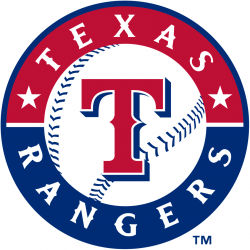 Logo 2003-Present |  | 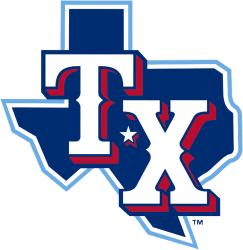 Alternate Logo 2020-Present |
Rangers Stadiums
Rangers Legends
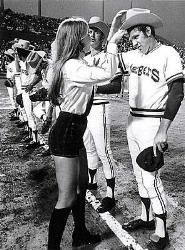 1972: Arlington rolls out a Texas sized weclo | 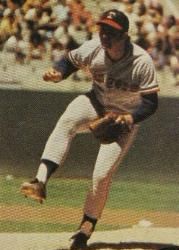 Dick Bosman 1972-1973 | 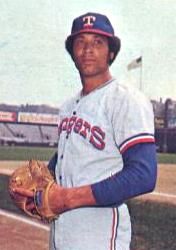 Jim Bibby 1973-1975, 1984 | 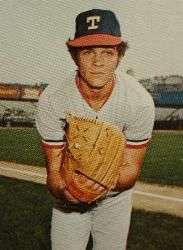 David Clyde 1973-1975 | 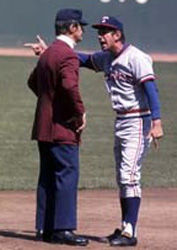 Billy Martin MGR 1974-1975 | 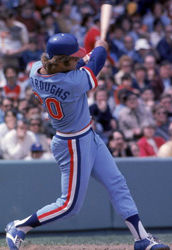 Jeff Burroughs 1972-1976 1974 AL MVP |
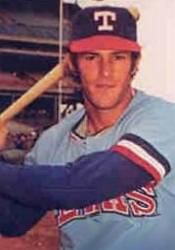 Tom Grieve 1972-1977 | 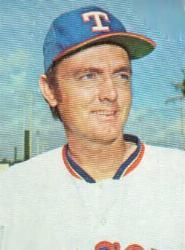 Bert Blyleven 1976-1977 | 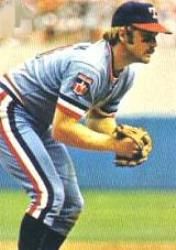 Toby Harrah 1972-1978, 1985-1986 | 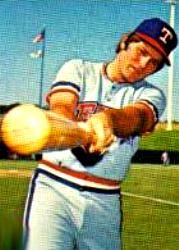 Mike Hargrove 1974-1978 1974 Rookie of the Year | 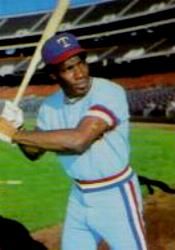 Bobby Bonds 1978 | 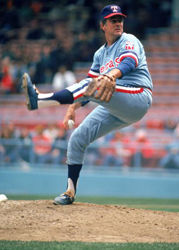 Gaylord Perry 1975-1977, 1980 |
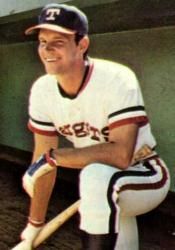 Richie Zisk 1978-1980 | 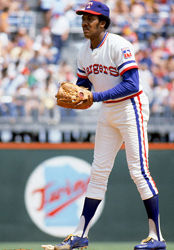 Ferguson Jenkins 1974-1975, 1978-1981 | 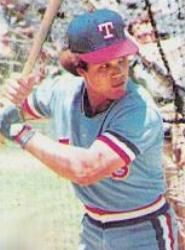 Bump Wills 1977-1981 | 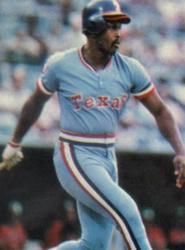 Al Oliver 1978-1981 | 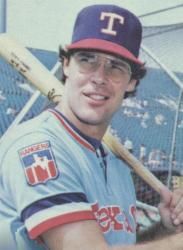 Johnny Grubb 1978-1982 | 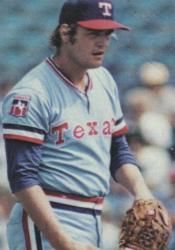 Doc Medich 1978-1982 |
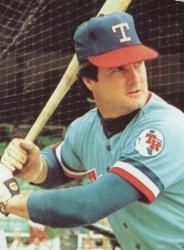 Jim Sundberg 1974-1983, 1988-1989 | 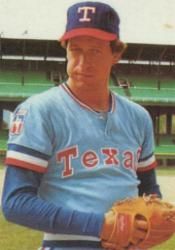 Jon Matlack 1978-1983 | 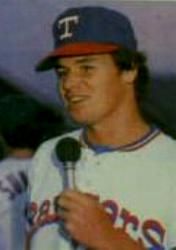 Rick Honeycutt 1981-1983, 1994 | 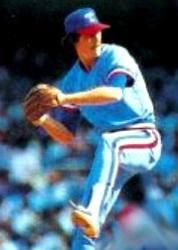 Danny Darwin 1978-1984, 1995 | 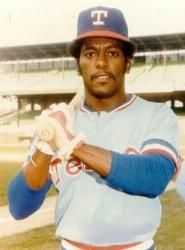 Billy Sample 1978-1984 | 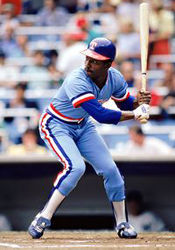 Mickey Rivers 1979-1984 |
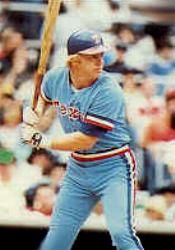 Buddy Bell 1979-1985, 1989 | 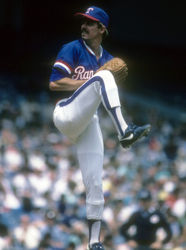 Frank Tanana 1982-1985 | 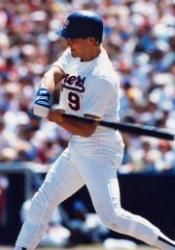 Pete O’Brien 1982-1988 | 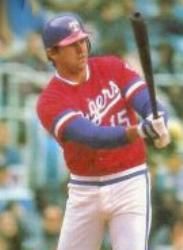 Larry Parrish 1982-1988 | 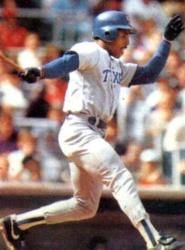 Oddibe McDowell 1985-1988, 1994 | 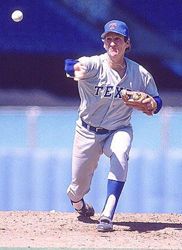 Charlie Hough 1980-1990 |
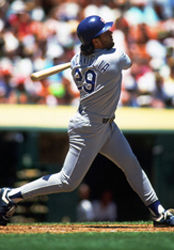 Pete Incaviglia 1986-1990 | 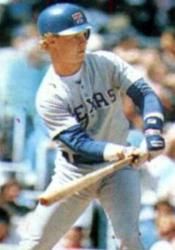 Steve Buechelle 1985-1991, 1995 | 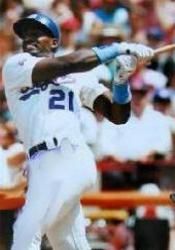 Ruben Sierra 1986-92, 2000-01, 2003 | 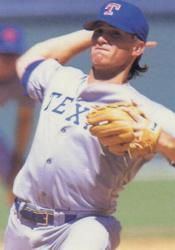 Bobby Witt 1986-1992, 1995-1998 | 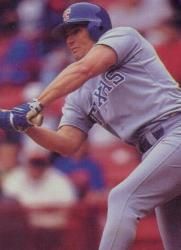 Brian Downing 1991-1992 | 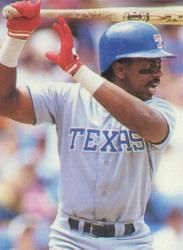 Julio Franco 1989-1993 |
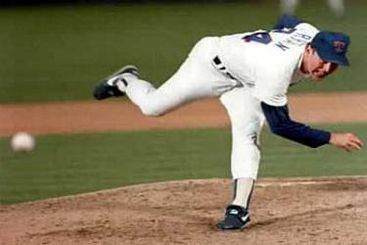 Nolan Ryan 1989: Career Strike out 5,000 | 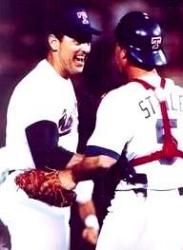 Nolan Ryan 5/1/91 No Hitter # 7 | 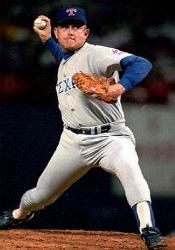 Nolan Ryan 1989-1993 5,714 Career Strikeouts | 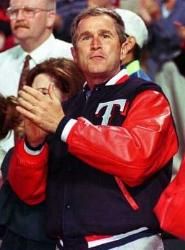 George W. Bush Owner 1989-1994 | 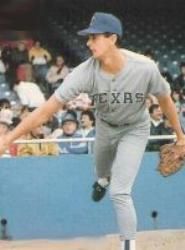 Kevin Brown 1986-1994 | |
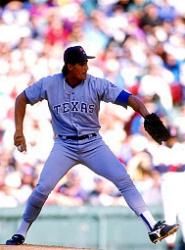 Jose Canseco 1992-1994 | 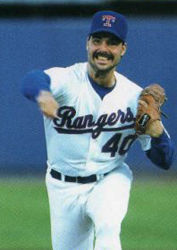 Jeff Russell 1985-1992, 1995-1996 | 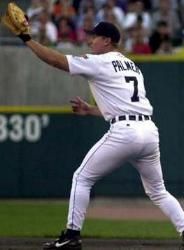 Dean Palmer 1999-2003 | 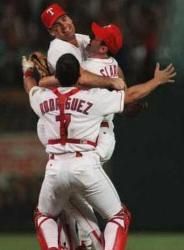 Kenny Rogers 7/28/94 Perfect Game | 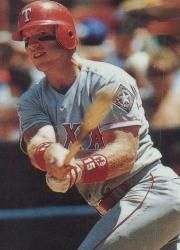 Mickey Tettleton 1995-1997 | 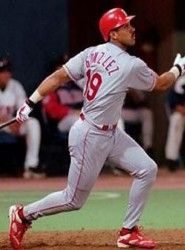 Juan Gonzalez 1996 & 1998 MVP |
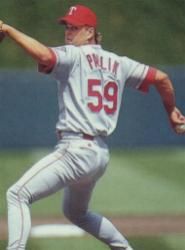 Roger Pavlik 1992-1998 | 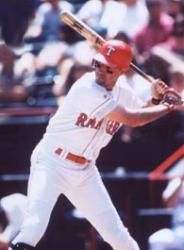 Will Clark 1994-1998 | 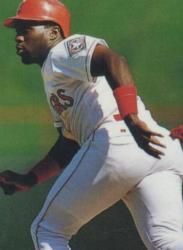 Mark McLemore 1995-1999 | 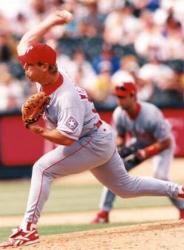 John Wetteland 1997-2000 | 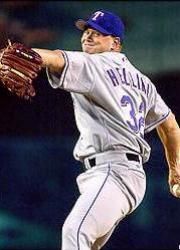 Rick Helling 1994-1996, 1997-2001 | 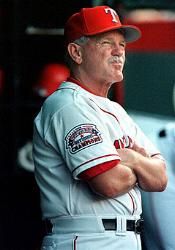 Johnny Oates MGR 1995-2001 |
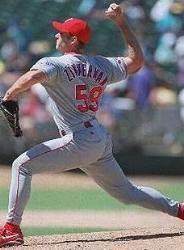 Jeff Zimmerman 1999-2001 | 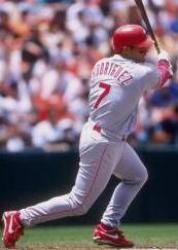 Ivan Rodriguez 1991-2002, 2009 1999 AL MVP | 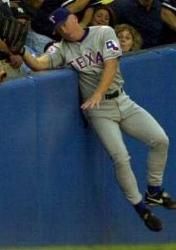 Rusty Greer 1994-2002 | 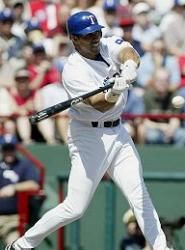 Juan Gonzalez 1989-1999, 2002-2003 | 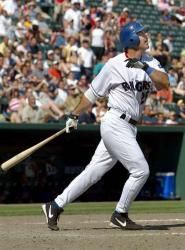 Rafael Palmeiro 1989-1993, 1999-2003 | 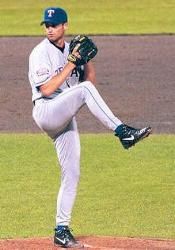 Doug Davis 1999-2003 |
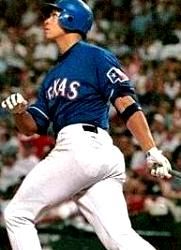 Alex Rodriguez 2001-2003 2003 AL MVP | 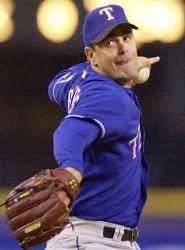 Kenny Rogers 1989-95, 2001-02, 04-05 | 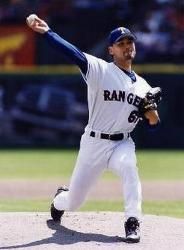 Chan Ho Park 2002-2005 | 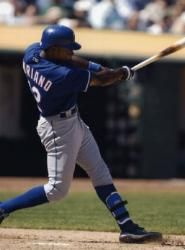 Alfonso Soriano 2004-2005 | 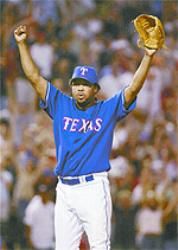 Francisco Cordero 2000-2006 | 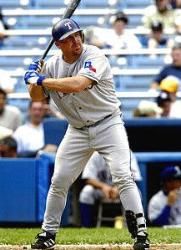 Kevin Mench 2002-2006 |
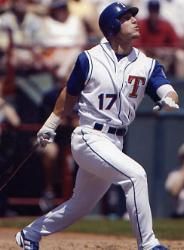 Laynce Nix 2003-2006 | 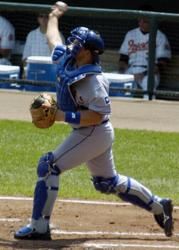 Rod Barajas 2004-2006 | 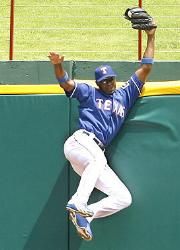 Gary Matthews Jr. 2004-2006 | 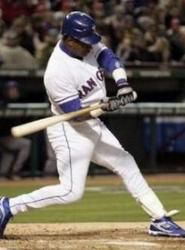 Sammy Sosa 1989, 2007 | 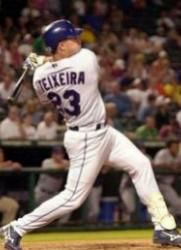 Mark Teixeira 2003-2007 | 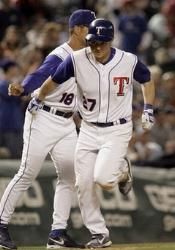 Frank Catlanotto 2000-2002, 2007-2009 |
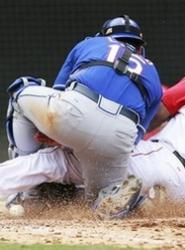 Gerald Laird 2003-2009 | 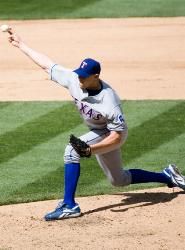 Kameron Loe 2004-2009 | 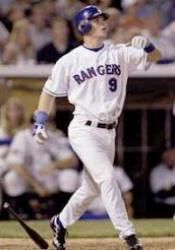 Hank Blalock 2002-2009 | 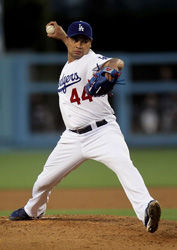 Vicente Padilla 2009-2011 | 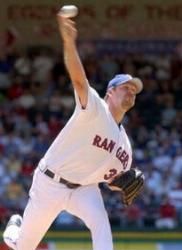 Kevin Millwood 2006-2009 | 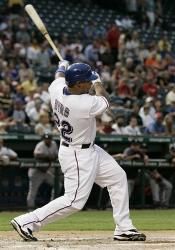 Marlon Byrd 2007-2009 |
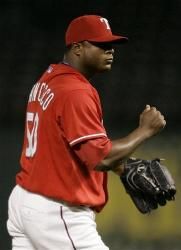 Frank Francisco 2004, 2006-2010 | 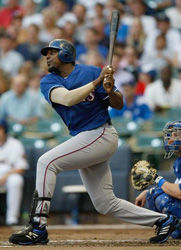 Vladimir Guerrero 2010 | 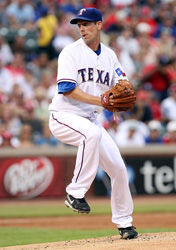 Cliff Lee 2010 | 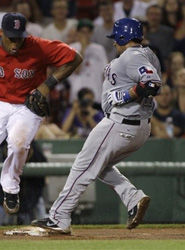 Bengie Molina 2010 | 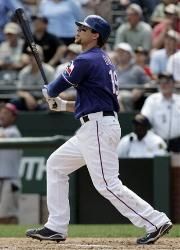 Chris Davis 2008-2011 | 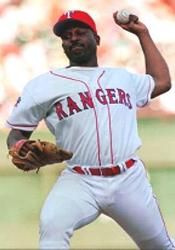 Darren Oliver 1993-98, 2000-01, 10-11 |
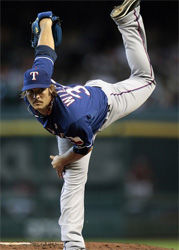 C.J. Wilson 2005-2011 | 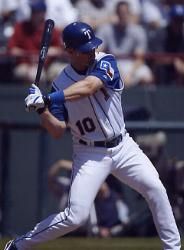 Michael Young 2000-2012 | 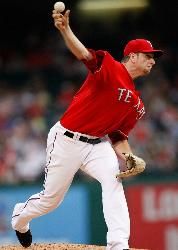 Scott Feldman 2005-2012 | 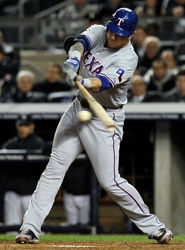 Josh Hamilton 2010 AL MVP & ALCS MVP | 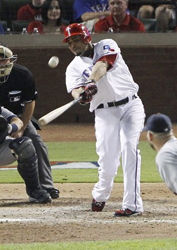 Nelson Cruz 2006-2013 2011 ALCS MVP | 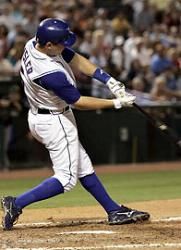 Ian Kinsler 2006-2013 |
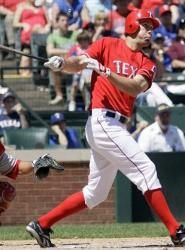 David Murphy 2007-2013 | 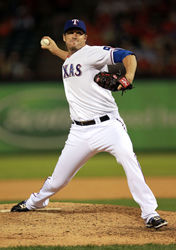 Joe Nathan 2012-2013 | 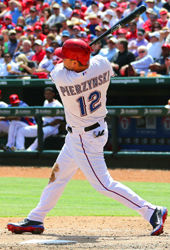 A.J. Pierzynski 2013 | 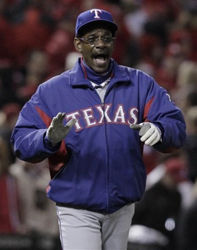 Ron Washington Manager 2007-2014 | 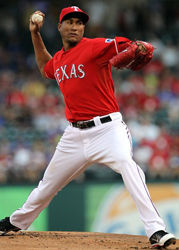 Alexi Ogando 2010-2014 | 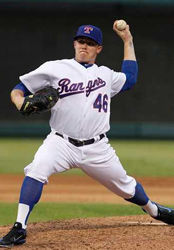 Robbie Ross 2012-2014 |
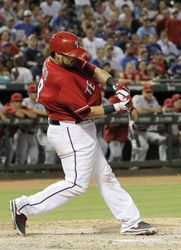 Geovany Soto 2012-2014 | 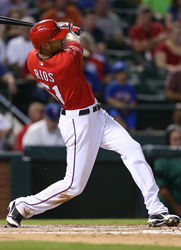 Alex Rios 2013-2014 | 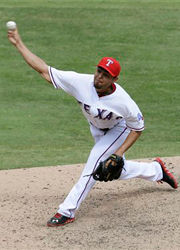 Joakim Soria 2013-2014 | 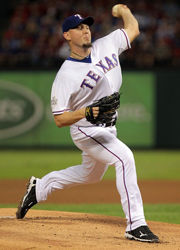 Matt Harrison 2008-2015 | 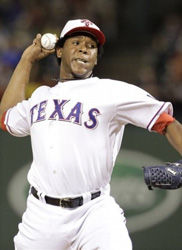 Neftali Feliz 2009-2015 2010 Rookie of the Year | 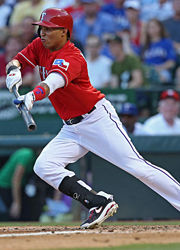 Leonys Martin 2011-2015 |
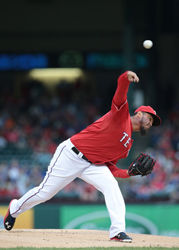 Yovani Gallardo 2015 | 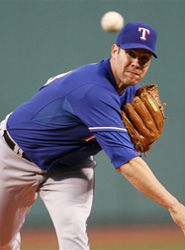 Colby Lewis 2002-2004, 2010-2016 | 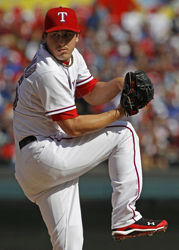 Derek Holland 2009-2016 | 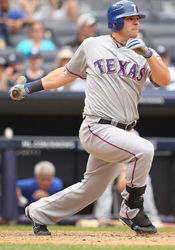 Mitch Moreland 2010-2016 | 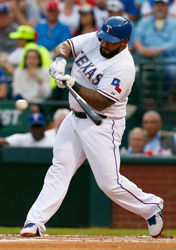 Prince Fielder 2014-2016 | 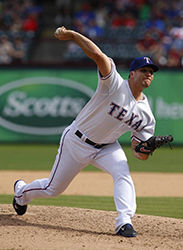 Shawn Tolleson 2014-2016 |
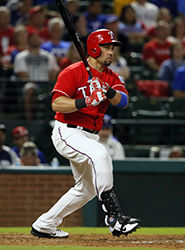 Carlos Beltran 2016 | 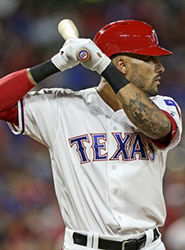 Ian Desmond 2016 | 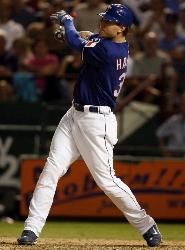 Josh Hamilton 2008-2012, 2015-2016 | 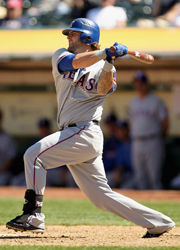 Mike Napoli 2011-2012, 2015, 2017 | 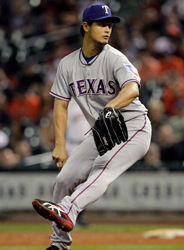 Yu Darvish 2012-2017 | 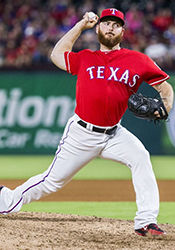 Sam Dyson 2015-2017 |
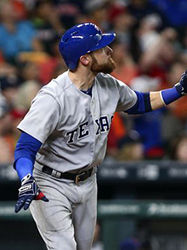 Jonathan Lucroy 2016-2017 | 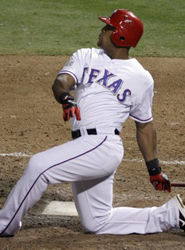 Adrian Beltre 2011-2018 | 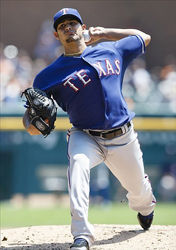 Martin Perez 2012-2018 | 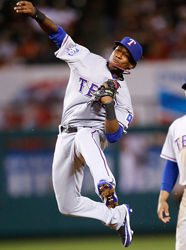 Jurickson Profar 2013-2018 | 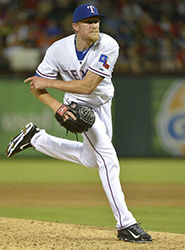 Jake Diekman 2015-2018 | 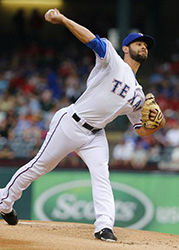 Cole Hamels 2015-2018 |
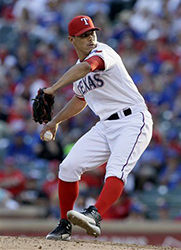 Keone Kela 2015-2018 | 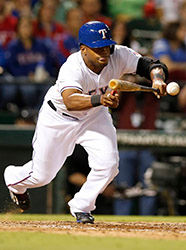 Delino DeShields Jr. 2015-2019 | 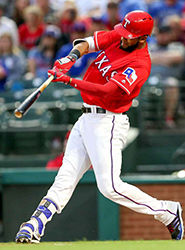 Nomar Mazara 2016-2019 | 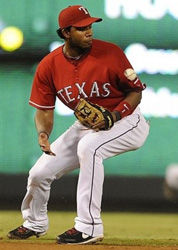 Elvis Andrus 2009-Present | 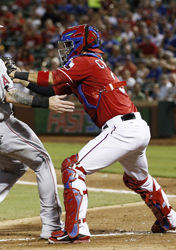 Robinson Chirinos 2013-2018, 2020-Pres. | 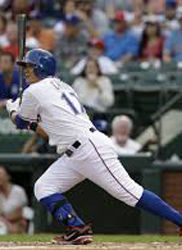 Shin-Soo Choo 2014-Present |
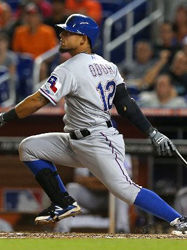 Rougned Odor 2014-Present | 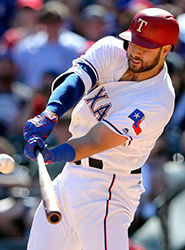 Joey Gallo 2015-Present | 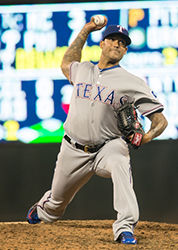 Matt Bush 2016-Present | 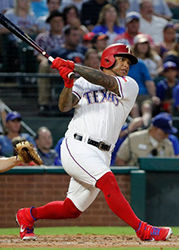 Willie Calhoun 2017-Present | 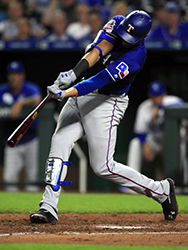 Ronald Guzman 2018-Present | 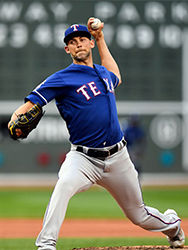 Mike Minor 2018-Present |
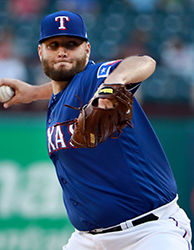 Lance Lynn 2019-Present | 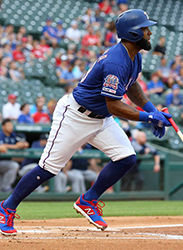 Danny Santana 2019-Present | 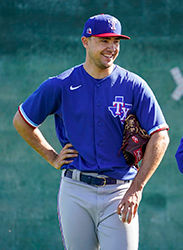 Corey Kluber 2020-Present | |||
